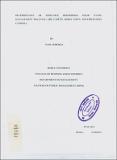| dc.description.abstract | This is report of thesis on the determinants of effective household solid waste management
practice in a case of Jirnrna town- Ethiopia using both quantitative and qualitative research
paradigms. The general objective of the study was; to analyze and identify the determinant
factors of effective household solid waste management practice in Jirnrna town and forward
the possible interventions. Data for the study was collected through the use of questionnaires
for households, interview with the head of municipality (mayor) and focus group discussion
with private waste collectors. The researcher used both quantitative and qualitative methods
of analysis particularly descriptive and inferential , statistics which include tables, charts (bar
and pie charts), percentage, frequency, mean, standard deviation and Chi-square and T-tests
to present and analyze data respectively. The result was significant and positive correlation
between the households' sex, educational level, years of stay, awareness level, willingness to
pay, access to private waste collectors, law enforcement, and effective household solid waste
management practices. These variables are significant at 5% level. Similarly, human power,
budget, facilities and equipments have positively significant.relationship with effective solid
waste management at household level. However, there is significant negative correlation
between households' family size, distance of the households' house from the main road and
effective household solid waste management at 5% level. Different from the above variables,
both household heads' age and monthly income have no significant relationship with
effective solid waste management ,at household level. As result indicated, there is no
significance difference between the two groups of households (effective and ineffective) in
both variables (age and monthly income). Moreover, no average mean difference between
effective and ineffective groups of household heads on age (i.e. both are at 44.66 years) and
it's the same is true for household heads on monthly income (i.e both are at 1667 birr).
Therefore, unlike the other variables, households 'age and average monthly income are not
the determinants of effective household solid waste management in the study area. | en |


